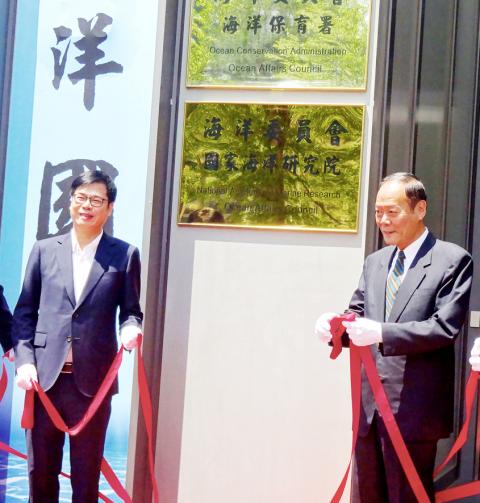Vice Premier Chen Chi-mai (陳其邁) yesterday inaugurated the National Academy of Marine Research in Kaohsiung, saying that it would boost the nation’s international participation in ocean affairs.
Establishment of the academy, which is overseen by the Ocean Affairs Council (OAC), comes almost a year after the council was established on April 28 last year.
The academy is tasked with planning ocean-related policy, assembling research and developing marine industries, Chen said.

Photo: CNA
It is also expected to boost connections between the nation and the global community by increasing participation at conferences and organizations, he said, adding that he hopes it would lead Taiwan to become a safe and prosperous maritime nation.
Academy Acting Director-General Chiu Yung-fang (邱永芳), a professor in National Sun Yat-sen University’s department of marine environment and engineering, accepted the agency’s seal from OAC Minister Lee Chung-wei (李仲威).
The Executive Yuan has authorized the academy to hire 80 officials, but it has only recruited 15, academy spokesperson Lin Shih-chang (林世昌) said.
The academy’s focus this year includes drafting a sea area management bill for areas beyond 3 nautical miles (5.4km) of the nation’s coastline, as well as conducting research on ocean current energy generation and marine geology in waters off the southeastern coast, Lin said.
The academy said in a press release that it also plans to build a fleet of ocean research vessels, which might mean its mission could overlap with the Taiwan Ocean Research Institute of the National Applied Research Laboratories.
The academy would seek to collaborate with the institute, as the latter has more research resources, Lin said.
Decisions on building vessels would be determined by higher authorities, he said.
It would be better for the nation to have different agencies managing official and non-official research vessels, an academic said on condition of anonymity.
A vessel’s basic information, including whether it is government-owned, can be viewed on the global Automatic Identification System, while its identity would influence its activity in territorial waters of foreign nations, the academic said.

A preclearance service to facilitate entry for people traveling to select airports in Japan would be available from Thursday next week to Feb. 25 at Taiwan Taoyuan International Airport, Taoyuan International Airport Corp (TIAC) said on Tuesday. The service was first made available to Taiwanese travelers throughout the winter vacation of 2024 and during the Lunar New Year holiday. In addition to flights to the Japanese cities of Hakodate, Asahikawa, Akita, Sendai, Niigata, Okayama, Takamatsu, Kumamoto and Kagoshima, the service would be available to travelers to Kobe and Oita. The service can be accessed by passengers of 15 flight routes operated by

Alain Robert, known as the "French Spider-Man," praised Alex Honnold as exceptionally well-prepared after the US climber completed a free solo ascent of Taipei 101 yesterday. Robert said Honnold's ascent of the 508m-tall skyscraper in just more than one-and-a-half hours without using safety ropes or equipment was a remarkable achievement. "This is my life," he said in an interview conducted in French, adding that he liked the feeling of being "on the edge of danger." The 63-year-old Frenchman climbed Taipei 101 using ropes in December 2004, taking about four hours to reach the top. On a one-to-10 scale of difficulty, Robert said Taipei 101

Taiwanese and US defense groups are collaborating to introduce deployable, semi-autonomous manufacturing systems for drones and components in a boost to the nation’s supply chain resilience. Taiwan’s G-Tech Optroelectronics Corp subsidiary GTOC and the US’ Aerkomm Inc on Friday announced an agreement with fellow US-based Firestorm Lab to adopt the latter’s xCell, a technology featuring 3D printers fitted in 6.1m container units. The systems enable aerial platforms and parts to be produced in high volumes from dispersed nodes capable of rapid redeployment, to minimize the risk of enemy strikes and to meet field requirements, they said. Firestorm chief technology officer Ian Muceus said

MORE FALL: An investigation into one of Xi’s key cronies, part of a broader ‘anti-corruption’ drive, indicates that he might have a deep distrust in the military, an expert said China’s latest military purge underscores systemic risks in its shift from collective leadership to sole rule under Chinese President Xi Jinping (習近平), and could disrupt its chain of command and military capabilities, a national security official said yesterday. If decisionmaking within the Chinese Communist Party has become “irrational” under one-man rule, the Taiwan Strait and the regional situation must be approached with extreme caution, given unforeseen risks, they added. The anonymous official made the remarks as China’s Central Military Commission Vice Chairman Zhang Youxia (張又俠) and Joint Staff Department Chief of Staff Liu Zhenli (劉振立) were reportedly being investigated for suspected “serious